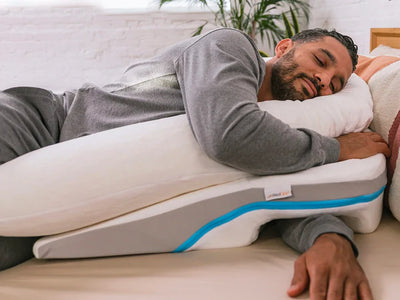
Related Product

Shoulder Relief System
$249.99 USD
Our system has a patented arm pocket that allows your arm to rest comfortably, alleviating pressure on your shoulder and triggering pain.
Arms Falling Asleep at Night When Sleeping
Share
If you have ever woken up in the middle of the night to your arm numb or tingling, you know how disconcerting it can be, especially if it happens frequently. It may have you wondering if something is wrong with your circulation or if another underlying health condition is going unnoticed.
For the most part, infrequent episodes of pain and numbness in your hands while you are sleeping is harmless, but in some cases, there may be a medical reason exacerbating the problem. There are a variety of causes that may be behind your arms falling asleep at night, and we’ll help you get to the bottom of it so you can stop your arms from going numb at night, put your worries at ease, and sleep better.
We recommend reading the post from start to finish to help you best understand your condition, but if you want to quickly identify causes or treatment options, you can use these helpful links as your guide:
- Why Do My Arms Go Numb at Night?
- When to See a Doctor
- How to Prevent Your Arms from Falling Asleep at Night
- Treatment for Hand & Arm Numbness
- Find Relief & Sleep Better
Why Do My Arms Go Numb at Night?
The sensation of tingling and numbness or pins and needles in your limbs is known as paresthesia. If you want to figure out why your arms go numb while sleeping, and find a solution that provides you with relief, it’s helpful to understand what’s happening in your body as you rest. Let’s take a look at some of the factors that can contribute to this uncomfortable physical sensation.

Your Sleeping Position & Posture
One of the main reasons people experience pain and numbness in their arms and hands while sleeping is a result of their sleeping posture. In certain sleeping positions, pressure may be put on nerve endings. When that pressure is not relieved quickly, it can then lead to a tingling, numb sensation in the affected limbs. This often occurs when you are sleeping with your arms pinned under you or your partner’s body.
According to Medlineplus.gov, sleeping in the same position and putting consistent pressure on the same arm night after night can also lead to a rotator cuff injury known as rotator cuff tendinitis. With these injuries, the tissue can swell, and bone spurs can form, exerting pressure on your nerve. When this happens, some people experience pain and numbness in their arms and hands or shoulder pain while sleeping.

If sleeping posture is the most likely cause of your arms falling asleep at night, using our specially designed Shoulder Relief System can help you find the optimal position for side-sleeping, limiting the pressure put on your arms and hands.
Nerve Pressure
In addition to excessive physical pressure on nerve endings making your arms go numb while sleeping, nerve damage can also contribute to this frustrating sleep disruption. Certain injuries can lead to nerve damage or disruption, having a lasting impact on your anatomy and interrupting the natural functions of your body.
There are several conditions that are associated with peripheral neuropathy (nerve damage that affects your arms and legs) or excessive nerve pressure that might be the cause of the numbness in your arms while sleeping.

These conditions include:
- Carpal tunnel syndrome: Many individuals with carpal tunnel have nerve damage that is caused by repetitive motion. You may experience numbness in your arms or hands while sleeping, when your wrists are bent because it’s putting excessive pressure on this nerve.
- Tennis or golfer’s elbow: Prolonged compression of your ulnar nerve can lead to an injury known as tennis or golfer’s elbow. Pressure on this weakened nerve or flexing of the elbow during your sleep may lead to tingling and numbness.
- Hypothyroidism: Hypothyroidism is characterized by low levels of the thyroid hormone. When you don’t have enough of the thyroid hormone in your body, fluid can build up and exert pressure on the nerves. Left untreated, it can result in nerve damage, often in the wrists.
- Diabetes: If you have diabetes, you may suffer from nerve damage, known as diabetic neuropathy. Numbness and tingling in the limbs is a side effect of this condition.
- Rheumatoid arthritis: During flare-ups, individuals with rheumatoid arthritis may experience periods of inflammation and other complications, which may cause compression on nerves.
While these are some of the most common culprits, there are quite a few other conditions, including thoracic outlet syndrome, ganglion cysts, lupus, Lyme disease, and cervical spondylosis that can cause similar symptoms. Conditions that cause peripheral neuropathy can also lead to numbness and pain in your feet.
Individuals who drink heavily may also experience pain and numbness in their arms and hands while sleeping. This is because you can develop alcoholic neuropathy. This occurs when excessive alcohol consumption causes damage to your nerves.

Vitamin B12 Deficiency
Vitamins are an important part of our daily nutrition that keeps our bodily functions working as normal; this includes vitamin b12. Without enough vitamin b12 in your system, you can experience issues with how your nervous system functions, which can lead to numbness in your hands and arms.
Based on your other symptoms or lifestyle, you may be able to deduce what’s making your arms numb when sleeping, or at least be able to narrow down the potential causes.
When to See a Doctor
In many cases, your arms falling asleep at night isn’t necessarily cause for alarm. However, if it happens often, while you’re awake, or is significantly impacting your sleep quality, it may be worthwhile to visit the doctor. There are also other symptoms, that when combined with pain and numbness in your arms and hands while sleeping, may be a sign of a bigger issue. If you experience the same feelings in your face, have trouble speaking, or notice sudden weakness or lack of coordination, you should speak with your doctor.
Your doctor can perform a physical evaluation to determine whether there is an underlying health issue contributing to your arms falling asleep at night. Depending on their evaluation, they may refer you to a neurologist to further examine for nerve compression.

How to Prevent Your Arms from Falling Asleep at Night
Often, arms go numb while sleeping, and we don’t even notice it happening throughout the night. But you might be thinking, “What if my arms falling asleep at night is waking me up?”. Thankfully, there are certain things you can do to help prevent numbness in your arms while sleeping, like physical therapy or sleeping with an arthritis pillow.
Some changes you can make to help prevent your arms from falling asleep at night include:
As we mentioned, sleeping posture is one of the most common causes of arms falling asleep at night. According to Sports-health.com, you can also relieve the pain and tingling associated with your rotator cuff injury by adjusting your sleeping position. Changing your sleeping posture might be easier said than done, it’s a habit you’ve formed over time, after all. However, our Shoulder Relief System is the perfect companion for this transition, making it easy to find a comfortable sleeping position by providing a uniquely designed pillow with an arm hole to reduce pressure.
Physical therapy or doing hand and arm exercises, including basic wrist stretches, can reduce the symptoms of carpal tunnel and other conditions by relieving pressure on the nerve and promoting better blood flow. In turn, this can help prevent your hands and arms from falling asleep at night.
If you tend to go numb in the hands or know that you have a condition like carpal tunnel that is affecting the median nerve, wearing a wrist guard or splint can help stop the problem by keeping your hand straight. This keeps the pressure off the nerve, so you don’t experience numbness or tingling.
Adding this vital nutrient into your diet is fairly easy, from taking a vitamin b12 supplement to eating more vitamin b12-rich foods (tuna, beef, eggs, dairy, etc.). Before you make any major changes to your diet, it may be beneficial to speak with your primary physician.
Limiting the amount of alcohol you drink, or completely cutting it from your diet can help you find relief. However, if you have an alcohol dependence, it can be harmful to go cold turkey. It is recommended instead that you get help from a professional to quit drinking without causing undue harm.
These techniques should help reduce or stop your arms from going numb at night. However, if you find that your arms go numb when sleeping, despite these prevention tips, your doctor may recommend a more formal treatment plan.
Treatment for Hand & Arm Numbness
In more severe cases or those that are associated with an underlying health condition, your doctor may recommend treatments such as:
Medication
There are a variety of medications that can help relieve numbness and stop your arm from falling asleep at night. Depending on your specific condition, you may be prescribed an anti-inflammatory medication to reduce pressure on the nerve. To relieve nerve pain, anti-seizure medication or possibly even antidepressants may be recommended.
Surgery
Undergoing surgery may be necessary to relieve pain and other symptoms of nerve damage. Surgeries can correct the underlying problem for those with more severe forms of the condition. Typically, surgery is not done until all other treatment options have been exhausted.
Find Relief & Sleep Better
If your arms go numb when sleeping and it’s interfering with your quality of life, the good news is you don’t have to suffer through it. With the right steps, you can find a way to relieve your discomfort and enjoy a better night’s sleep.
Related Product

Shoulder Relief System
$249.99 USD
Our system has a patented arm pocket that allows your arm to rest comfortably, alleviating pressure on your shoulder and triggering pain.
